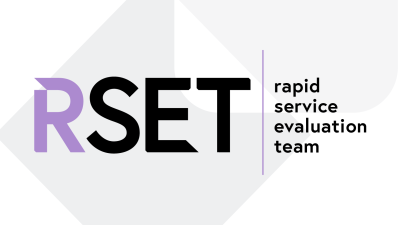
Rapid evaluations of new ways of providing care.
Latest from the RSET project
The Rapid Service Evaluation Team is a group of health service researchers from University College London, Nuffield Trust and the University of Cambridge working on an NIHR-funded project to rapidly evaluate new health and care services and policies.
As the NHS emerges from Covid-19 and the biggest shock to its system in its 75-year history, it faces a set of existential challenges: an ageing population in need of ever-more complex care and dependent on new technologies and innovation; a fast-growing backlog of operations that was ramping up well before Covid started; and an overstretched body of staff struggling to keep the show on the road – all underscored by a precario us financial picture.
us financial picture.
More than ever, the NHS needs to develop new ways of providing care in cost-effective ways. And when a new approach works well, it needs to understand and share learning about that success with other parts of the health and care system quickly. So there has never been a more relevant time for rapid evaluation – the robust assessment of innovative practices within the health care system that takes place at speed and in collaboration with the innovators.
To meet this challenge, the Rapid Service Evaluation Team (RSET), comprising health service researchers, health economists and other colleagues from University College London, the Nuffield Trust and the University of Cambridge, have been funded by the NIHR to come together for another five-year period to rapidly evaluate vital new ways of providing and organising care.
We produce rapid studies of new health and care services and policies. We look at how they are set up, how they work for all involved, and how they affect patient care and health, value for money, and inequalities.
Read the full study protocol here
This programme is funded by the National Institute for Health and Care Research, Health and Social Care Delivery Research programme (RSET, Project no. NIHR156380). The views and opinions expressed therein are those of the authors and do not necessarily reflect those of the HS&DR, NIHR, NHS or the Department of Health and Social Care.
Join the RSET mailing list
Sign up to receive regular updates on the rapid evaluation projects and outputs we're pursuing, understand how the evaluations are carried out and see the findings of our work as we progress.
Key RSET outputs
What we're doing
We carry out rapid evaluations of health and care innovations, in close partnership with those who deliver, manage and use these services, to produce timely findings of national relevance and of immediate use to decision-makers.
How we want to do it
- Working in partnership with patients, the public and evidence users to co-produce meaningful evaluations of innovations implemented in health and care systems and services in England and other home nations
- Collecting/accessing relevant and timely data to evaluate innovations, including potential impact on inequalities
- Using existing and novel analytical methods to evaluate innovations and produce timely findings of national relevance and immediate use to decision-makers
- Generating formative and summative lessons on innovations (e.g. on scalability and transferability of innovations) using rapid, innovative approaches so that learning can be used quickly in other parts of the health and care system
- Developing and sharing learning about methods and our experiences of rapid evaluation.
How we're evaluating
We conduct rapid, rigorous and co-produced mixed-methods multidisciplinary evaluations. The methods will be tailored to the individual needs of each evaluation, but they'll typically combine a range of qualitative and quantitative methods. We embrace innovative methodological approaches and aim to recruit a range of sites in different healthcare settings that have implemented each innovation, to compare across different organisational contexts. Evaluations will include a wide range of participants (e.g. patients, carers, healthcare providers) with diverse backgrounds.
How we're sharing results
We want the findings from our research to have a timely impact. We believe that sharing findings as they emerge will increase their impact and benefit for patients, the public, and the health and care systems. So we'll share our findings rapidly with the people who are making changes.
For each project, we are working with our partners to agree how best to share lessons from our work effectively. We are experts in doing this, and have excellent links with health and care services across the country.
We are also making use of user-friendly summaries, blogs and webpages, workshops, present at conferences, and publish research articles that can be read freely by the public.
Who we're working with
We involve patients, and the public, clinicians, and those running health and care services at every stage of our research, both within projects and across the programme as a whole.
We work closely with the NIHR, and be guided by our Stakeholder Advisory Board, which looks at
- whether we are doing what we set out to do
- keep us up to date on the latest service changes, and
- tell us what they think about our new plans for research.
How should rapid evaluations be carried out?
Get the lowdown in the RSET team's new essay exploring the emerging field of rapid evaluation in health and social care, and understand how rapid evaluation is distinctive from other forms of applied research.
Working together: rapid evaluation of Covid oximetry at home
This session looks at lessons from commissioners, researchers and clinicians working together on an evaluation of Covid Oximetry at home. Session at the February 2022 rapid evaluation conference organised by the Nuffield Trust and the Health Foundation.





